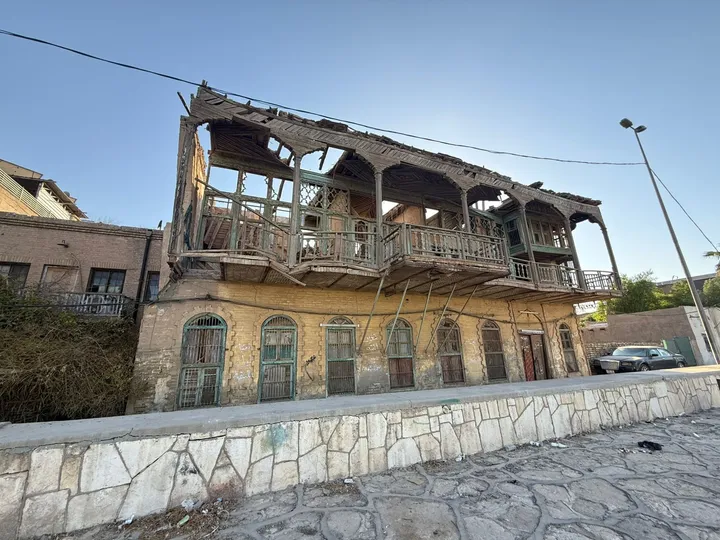A four-century-old architectural marvel in Bursa has risen to its past splendour when it served as a repository of faith and wisdom for the Mevlevi religious order founded by 13th-century poet-philosopher Rumi.
The ancient Mevlevi Lodge has been meticulously restored in a project undertaken by the Bursa Metropolitan Municipality, the civic body said in a statement.
The building, which was in a dilapidated condition due to the ravages of time, was demolished in the first quarter of the 20th century to make way for water reservoirs.
With diligent attention to detail, the lodge has been restored to its original splendour, adorned once again with ornate ceiling decorations, intricate wooden carvings, and harmonious landscaping.
Situated near the revered Pinarbasi Cemetery, the Mevlevi Lodge was founded by Cununi Ahmed Dede, also known as Ahmed al-Mevlevi, an important figure of the Mevlevi order, during the 17th century.
Evliya Celebi, the well-respected Ottoman-era traveller and writer who visited Bursa in 1620, the same year the Mevlevi Lodge was established, wrote in his travelogue that this building was larger than the other lodges in Bursa and consisted of around 70-80 rooms and a large ‘semahana’ (the whirling hall used by dervishes for their performances).
The Mevlevihane, which continued its existence until 1925, was demolished together with its outbuildings after the closure of the dervish lodges by the state.
The harem section was left to the family that owned the building, while the reception area was used as military barracks.
A water reservoir was built where once the semahana stood.
The wooden tomb was also demolished and replaced by a reinforced concrete building.
Order of universal love
The Mevlevi Order, also known as Mawlawiyya, is a venerable Sufi order with its roots tracing back to the historic city of Konya, nestled in what is now modern-day Türkiye.
Inspired by the teachings of the Sufi mystic and Islamic theologian Jalaluddin Muhammad Balkhi Rumi, this mystical tradition has captivated hearts with its distinctive practice of whirling during the sacred ritual of ‘dhikr’, or remembrance of God. This practice has led to their popular nickname, the “whirling dervishes”.
Rumi's profound spiritual insights and poetry became the cornerstone of the Mevlevi order's philosophy, emphasising love, devotion, and the pursuit of spiritual enlightenment.
Central to the Mevlevi tradition is the ritual of sema, or the whirling dance. This mesmerising practice, symbolising the soul's journey towards union with the divine, has become synonymous with the order.
Through rhythmic spinning, Mevlevi dervishes aim to reach a transcendent state of spiritual ecstasy, seeking a deep connection with the divine presence.
In Bursa, the Mevlevi order flourished in the 15th century, attracting a devoted community of disciples and becoming an integral part of the city's spiritual fabric. The Mevlevi lodges, such as the one restored in Bursa, served as centres for spiritual practice, knowledge transmission, and communal gatherings.
The restored lodge
The restoration of centuries-old Mevlevi Lodge has not only revived its architectural magnificence but also breathed life back into its hallowed halls.
Comprising various sections such as the whirling hall, the tomb, the noble court, the kitchen, the dedegan (dervish) cells, and the elegant reception area, the lodge has symbol of heritage in the region.
Stepping into the enchanting whirling hall, one is captivated by the intricate ceiling work and the mesmerising wood carvings, evoking a sense of awe and wonder.
Meanwhile, the kitchen section has been transformed into a living museum dedicated to showcasing the multifaceted aspects of Mevlevi culture.
Visitors will have the opportunity to immerse themselves in the rich traditions through expert-led music and calligraphy lessons offered in collaboration with Bursa Uludag University.
Mayor Alinur Aktas, whose vision guided the restoration process, envisions the Bursa Mevlevi Lodge as a vital part of the larger Hanlar District Urban Transformation Project.
Alongside the historic tombs of Osman Gazi and Orhan Gazi, founding fathers of the Ottoman dynasty, the Tophane Square, Zindan Gate, and the magnificent Fortress area, this restored sanctuary will transform the region into a historical island—a haven of cultural heritage waiting to be explored.
Bursa, city of saints
Bursa, a city with a long and remarkable history, held great significance during the time of the Ottoman Empire, as it does today. After it was captured by Orhan Bey – the son of Osman Bey, founder of the Ottoman Empire – in 1326, Bursa became the capital city.
Beyond its grandeur as a former capital, Bursa holds a distinct place as a city of saints, where spirituality and reverence intermingle with its architectural splendour.
Within the city's sacred walls, the tombs of notable saints became revered sites of pilgrimage, drawing devotees from near and far.
As the Ottoman Empire flourished, Bursa's spiritual landscape evolved further.
The city witnessed the establishment of vibrant theological schools and Sufi lodges, nurturing spiritual seekers and providing a platform for disseminating knowledge and wisdom.
Bursa's prominence as a city of saints shaped not only its religious fabric but also its architectural marvels. Magnificent mosques, adorned with exquisite calligraphy and intricate tilework, rose majestically in the skyline, standing as symbols of devotion and artistic excellence.
These grand structures, such as the Great Mosque (Ulu Cami) and the Green Mosque (Yeşil Cami), continue to captivate visitors with their timeless beauty.
Even today, Bursa's heritage as a city of saints endures. The tombs of revered figures, such as Sheikh Edebali, who is known as the spiritual founder of the Ottoman Empire; Abdal Murad, one of the 40 saints who participated in the conquest of Bursa, Mullah Fenari, the first Shaykh-al-Islam of the Ottoman Empire, serve as reminders of the city's spiritual legacy.
























